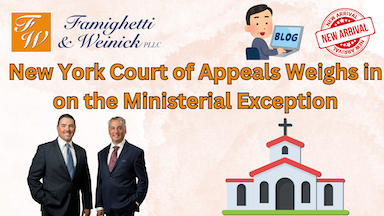- Free Consultation: (631) 352-0050 Tap Here to Call Us
New York Court of Appeals Weighs in on the Ministerial Exception
On November 26, 2024, New York State’s highest court, the Court of Appeals, decided a case concerning the ministerial exception to employment discrimination cases. Famighetti & Weinick previously blogged about this exception. Now, the Court of Appeals has weighed in on the subject. Today’s Long Island employment law blog discusses Ibhawa v. New York State Division of Human Rights.
What is the Ministerial Exception
The ministerial exception arises in the context of employment discrimination cases in religious institutions. The United States Supreme Court first established the exception in 2012, in a case known as Hosanna-Tabor. The Court later revisited the issue in Our Lady of Guadalupe School v. Morrissey-Berru. Essentially, the Supreme Court ruled that the First Amendment allows religious institutions to decide matters of church government, free of state interference. The ministerial exception basically says that religious institutions can choose their own religious leaders, even if those decisions are tainted with an otherwise discriminatory motivation.
Put another way, and in an example frequently seen by employment lawyers, a Catholic school could decide to terminate a religious teacher if it learned that the teacher was not married and was pregnant. For non-religious based employers, such a decision would likely constitute pregnancy discrimination. Under the ministerial exception, however, the religious school would likely not be liable.
The Court of Appeals Reviews the Division of Human Rights Decision to Dismiss a Case
In Ibhawa, the employee worked for a Church as Parish administrator. Ibhawa is black and of Nigerian national origin. The employee alleged that during his employment, he was subjected to derogatory remarks concerning his race and national origin. Accordingly, he filed a charge of discrimination with the New York State Division of Human Rights, alleging a hostile work environment and unlawful termination. The Division of Human Rights is an administrative agency which reviews claims of workplace discrimination in New York.
In the State Division, the church argued that the complaint must be dismissed because of the ministerial exception. It argued that its decision about who will lead its congregation and teach its faith clearly place the case into the ministerial exception. The State Division agreed that the case came within the ministerial exception and so it decided that the agency lacked jurisdiction over the case. The Division dismissed the case.
Inhawa appealed to the state courts. At the trial court level, the court ruled that the exception applied only to the unlawful termination and reversed the part of the Division’s order dismissing the hostile work environment claim. At the appellate level, the court reversed the trial court and dismissed the case entirely.
Ibhawa then appealed to the Court of Appeals, New York’s highest court. The Court first addressed a matter of procedure. The Court of Appeals noted that it had authority to review the State Division’s agency for errors of law, for determinations which are arbitrary and capricious, or for abuse of discretion. The Court ruled that question before it concerned an error law, so the Court could review the decision. Moreover, because the question was purely a question about law, the Court was not required to give deference to the administrative agency.
The Court of Appeals ruled that the State Division made an error of law. The Court determined that the ministerial exception is an affirmative defense. This means when that when the Division dismissed the case on the basis of lack of jurisdiction, it committed an error law. By determining it lacked jurisdiction, it was in effect saying it did not have the power to consider the employee’s claim. But, that is not how the ministerial exception works. It does not mean that the agency or court does not have jurisdiction. Instead, it means the agency/court must determine the merits of the ministerial exception defense presented by the employer.
Accordingly, the Court of Appeals reversed the appellate court’s decision and ordered that the case be sent back to the Division of Human Rights. At the Division, the agency will be required to decide the case in accordance with the Court of Appeals’ decision.
Employment discrimination cases can be tricky. Because of the ministerial exception, employment discrimination cases getting trickier when the employer is a religious institution. Speaking with an employment attorney who is experienced with the ministerial exception can save employees time and money by avoiding litigating cases which may be dismissed based on the ministerial exception.
New York employment lawyers Famighetti & Weinick PLLC can help employees of religious institutions navigate the tricky waters of employment discrimination cases. We are available at (631) 352-0050. Our Orange County New York office is available at (845) 660-0040.









